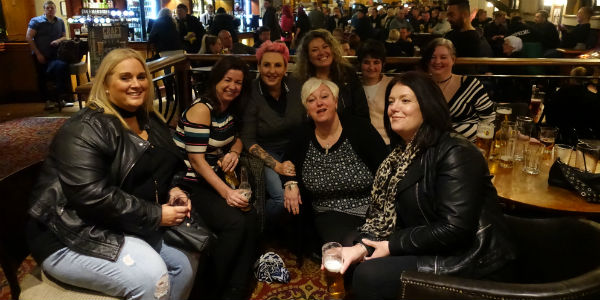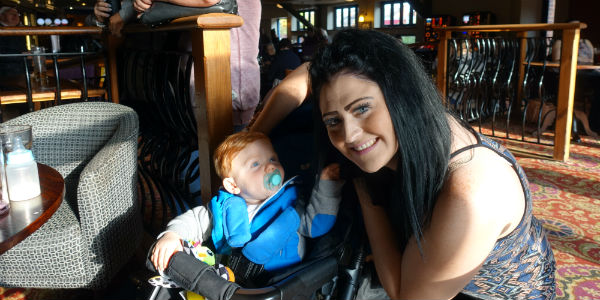‘Stuck in their ways’: how we blame the poor for their failure to embrace globalisation
We find it easier to talk about class in purely economic terms. Lisa McKenzie argues that in fact our perceptions of class are tightly bound up in stigmatising value judgments. The same impulse that condemned the ‘undeserving poor’ to workhouses is apparent in condemnation of the poor for their attachment to the local in the face of a globalised economy.

Some of the author’s interviewees. Photo: Lisa McKenzie
Class division and the social sciences
Over the past century, the Marxist theory of class inequality based on who owns the means of production has been challenged – and rightly so, as class division does not solely rest upon economic inequalities but also cultural inequalities. While I fully accept Marx’s theory that the economic capitalist system is based and founded on absolute arrangements of exploitation, class inequality also rests in meanings, hierarchies and value judgments. It is not solely about who makes the decisions, but who establishes these judgments.
Yet in the social sciences class division has always been a difficult subject, precisely because of those systems of exploitation and how they work in praxis. It has been easier in the last century for intellectuals to speak of class disadvantage in forms of ‘poverty’ rather than inequality. The idea and the concept of poverty is easier to tackle than that of inequality, and especially the unequal distribution of power and resources within a society. How do you know if you have too much?
Yet class division by any definition – whether that of Marx, Goldthorpe or Savage – has a subjective dimension. Indeed some individuals may not know or identify with a defined class position, but define themselves within the context of their lived experience. Consequently, measuring and surveying this type of class inequality, exploitation and injustice between groups have become increasingly difficult within the social sciences.
Moreover, many Western European countries entered into social contracts post-1945 that include the provision of health, education, housing and social insurance schemes as a means to counter levels of absolute poverty and manage risk. Policy makers, politicians, and their friends in academia over the last 60 years have claimed to eradicate poverty. And the conversations have increasingly been turned away from class inequality and exploitation, and towards a conversation about personal failures among the poor.
Precarity and stigmatisation
The precariat, according to Guy Standing (2011), are a group of people across the world who live and work precariously, usually in a series of short-term jobs and without recourse to stable occupational identities or careers. They lack stable social protection and regulation does not apply to them. They include migrants, but also locals. Standing explains that this class of people are producing new instabilities in society. They are increasingly frustrated and angry but also dangerous because they have no voice, and are hence vulnerable to the siren calls of extreme political parties – and/or may remove themselves from democratic systems of government completely. At the same time, they attract loathing, stigma, ridicule and amusement through their methods of managing their fear and precariousness.

Photo: Lisa McKenzie
This management of fear comes through closely identifying with the local, and tightening their notions of identity through ‘who we are’ and through complicated and voracious notions of belonging. It is manifest in distinct cultural forms: likes, choice of clothing, speech and their strong connection to community belonging and values. As a result, these people are dismissed as old fashioned, immovable, rigid and unable to bend to the wishes of a globalising market. The ways in which they dress, speak, walk and how they raise their families come under scrutiny and they are devalued. When Britain needs people to serve coffee, clean hotel rooms and look after its children there are ’better’ working class people from Italy, Poland, Nigeria or Brazil who can be enlisted.
The dangerous class
Working class people are not only loathed and blamed for their own poverty, but they are also stigmatised as ‘dangerous’. Generations of Britons have debated the ‘state’ of the poorest people: their usefulness, their behaviour, their values and their taste. We have also debated who they are, how we can define them and what we call them. Middle-class anxiety about the poor stretches back to at least 1601 with the introduction of the Poor Law. In 1832 a Royal Commission, under the chairmanship of the Bishop of London, conducted a detailed survey of the state of poor law administration. His report took the view that poverty was essentially caused by the indigence of individuals rather than economic and social conditions. If not dealt with, the poor become dangerous and criminal.
The Commission’s 22 recommendations were to form the basis of the 1834 Poor Law Amendment Act. It led to a major overhaul of how poor relief was administered, splitting the poor into the deserving (respectable, perhaps ‘unlucky’) and (deviant, problematic, and criminal) (Welshman 2007).
Culture value and the Great British Class Survey
I was part of the Great British Class Survey team working with Mike Savage. My role was to take the survey to the group at the bottom that were identified as ‘precariat’ – they are working class people, but do not have the stability of employment, homes, and social goods that previous generations after 1945 had secured through their political involvement with co-operative and trade-union movements. As I asked groups of women and men in East London and in Nottinghamshire the survey questions, I was struck that the participants knew that they were getting it wrong. They knew what I was really asking in terms of class, culture, and value. They knew that their answers were not valued or ‘legitimate’. They knew that disliking opera had a value judgment attached to it. They knew that their liking the TV programme Mrs Brown’s Boys would be judged too, but to them one was funny and the other was boring. Although many of the respondents had seen opera on television or heard operatic music, it didn’t seem like anything they might want to do after a hard day at work. “It seems like hard work to me,” said one young mother from Nottingham. This was difficult and embarrassing for me. I knew what I was really asking, and so did they; I also knew what their answer would be, and they knew I knew. It became even more embarrassing when we got to the next question on the survey, which was about bingo. This is a clear example of how cultural capital works within people’s lives and also how it is used to create and reproduce elitism and stigma. When stately homes, opera, and museums are your pursuits, you know these activities are recognised as ‘good taste’. They enable you to move through society easily. But when your interests and activities are going to the bingo, the pub or watching the telly, these answers count against you. They show you up.

One of the author’s interviewees. Photo: Lisa McKenzie
Many people have asked me about these kinds of judgments. Why are some things more valued than others? And why are other things devalued, even though you like them? One of the most common questions I get asked from women is about the way they dress, and why they are ‘looked down on’ for wearing big hooped gold earrings, and why when a TV show wants to show a ‘common’ character it shows her with a ponytail, wearing a tracksuit and gold jewellery.
This is the cultural element to class distinction, and is as significant to inequality and injustice as the economic material forces which produce it. Bev Skeggs (2005) has argued that the consequences of stigmatisation, and rebranding the poor working class as valueless, have been central in producing new ways of exploitation through the fields of culture, and media, inventing new forms of class differentiation which are produced through processes of what Pierre Bourdieu would term symbolic violence.
How can we stop stigmatising the poor? We should start by admitting the problem, and recognising snobbery for what it is: a means of legitimising cultural distinction and perpetuating the status quo. Then we should be clear that to be working class is not an admission of failure or lower status. It could mean a cultural system of shared values, communitarianism, co-operativism: a sense of localism, rather than failure to achieve mobility. And we should realise that true social mobility would mean some of the children of the rich and the middle classes moved ‘down’ the social ladder.
This post represents the views of the author and not those of Democratic Audit.
 Lisa McKenzie is a research fellow at the LSE.
Lisa McKenzie is a research fellow at the LSE.





 Democratic Audit's core funding is provided by the Joseph Rowntree Charitable Trust. Additional funding is provided by the London School of Economics.
Democratic Audit's core funding is provided by the Joseph Rowntree Charitable Trust. Additional funding is provided by the London School of Economics.
[…] View Original: ‘Stuck in their ways’: how we blame the poor for their failure to embrace globalisation […]
An awkward issue here, of course, is the degree to which the young middle class, with all their advantages, appear never since the War to have been further away in spirit and proximity to the working class. Protected and coddled by anxious parents from getting too close to anything ‘unsafe’, and fighting among themselves for unpaid internships on newspapers and magazines and film production companies, their attitude towards the working class now appears to range from total dismissiveness to brutal views that they are nasty and horrible: during the EU Referendum, many middle class children campaigning came very close to saying that the lower orders really, I mean, yah, shouldn’t kinda be allowed to, well, vote…they certainly meant that.
Listening to them after the result of that vote, I was minded of many characters in fiction, but above all one being the portrayal, in the 50s film version of Priestley’s An Inspector Calls, of the dragonlike team of middle class Edwardian ladies who headed up interviewing to decide who were the deserving poor – they knew nothing, heard nothing, were judgmental and deeply nasty into the bargain when their own views or interests appeared to be even mildly under threat, or heaven forbid when the working class person dared to venture a view.
The fact that we are moving away further from a solution to this problem is an irony when young people are all supposed to be voting for a kinder more caring society and supporting a radical solution – but it is a dehumanised approach, in the way that the same type of young people made a similar radical choice in, say, Germany, in the 30s. It is all about theory and comes with middle class fashionable baggage – woe betide any working person who does not fit the identikit that has been laid down for them or utters views about (for example) migration that they are not allowed to.
To this I would just add that there IS only one way, alas, that this issue will currently be tackled in present circumstances, and it is close to what the author alludes to. It is to blame the poor, however wrong and unfair that is. Otherwise it means admitting that the elites have it wrong. And we can’t have that, can we? It is in fact just like how the left-of-centre media has bought the total lie spread by the EU and IMF that the Greece crisis is all the fault of ‘reckless Greeks’ (it is not, it is the fault of elites and the bodies spreading the smears… plus political failures). Easier just to attack the working class for its views and suggest that they should not really have a voice because they do not agree with current middle class trends
Yes, Damian, well put, but, the Greeks are also a political collective, like the British working class who have bought into the globalisation thing. A collective can be seen as a herd, even if divided into many sub-herds. Can you honestly blame any one politician, other than Bliar and a few of his mates, or any one particular rich person or well-off middle class person for the kind of society that Britain is? Hardly, I should think. Yet, as a collective, the Greeks are indeed responsible for their state of affairs. They are organised as a nation-state, or dis-organised is perhaps a better word. Looking back forty years in the affluent West, the working class has got totally sucked in by the corporate consumerist globalising coca-colonisation cultural cloning movement. Jesus is alleged to have intimated that the poor will always be with us. He is alleged to have meant the poor in spirit. The welfare state was horribly abused by the working class and by the middle class even more once the race was on to rort the system to every possible extent. Many decent people did not participate in this headlong rush to live off the nation’s and taxpayers’ largesse, but that did not stop the class war from being re-invigorated. In Holland, many years ago, a tobacconist put a sign in his window reading ” Groote stelen en kleine stelen, maar groote stelen het meest”. The tobacconist was made to take the sign away. It meant both that he had pipes with long stems and short ones and that he was saying that the big people steal and the little people steal, but big people steal the most. Apart from the drive to re-colonise the world and also the western nation-states from which the transnational corporations are operating, and so to create a world empire of so-called free enterprise capitalism, which is basically a one world technocratic kleptocracy, the body politics serving the transnational corps became more enamoured of the cosmopolitan way of thinking and soon drifted into a false cosmopolitan internationalism. Many supporters of one world government, globalisation or simply bare-faced personal opportunism never dwelled in the cosmopolitan or international mindset. Many from the working class went straight to chutzpah squared opportunism or simply went with the flow in ignorance of the moral ramifications. In finance, economics, politics and mind control, there is a pyramid of sorts which functions as an hierarchy. Most people do not care to understand society and how it works, even if they were able to do so. That is a moral deficit in a working or nominal democracy which has clear, direct and long-lasting repercussions for the society that is formed by the collective these people are part of. Hence, the collective is responsible for the current state of affairs. Those on benefits all these years, for whatever reason, have failed almost to a man/woman to pull their weight as part of the democratic collective. How do I know this, you wonder? Well, due to circumstances beyond my control, I have been unemployed for 25 years without receiving any benefit, self-supporting. I have used that time to study this issue. Look around you and see how people live, how they think and how they are politically active, or not as the case may be. Only now are people in the West waking up, and slowly at that. Just look at the way people vote. Of course there are the poor in spirit. They have been cast aside and trampled in the rush for go-getting and good living, even by the tax-free institutions who are nominally tasked with looking after the poor and poor in spirit. There are many good people everywhere, but mostly deluded as to how they are functioning in the collective. The deserving poor will be avenged, but not necessarily to their benefit in this their life, because that is not how it works.